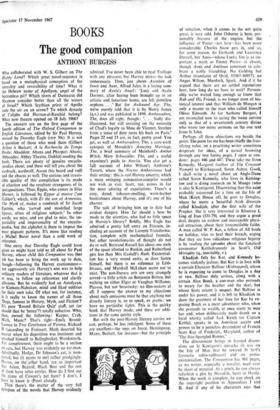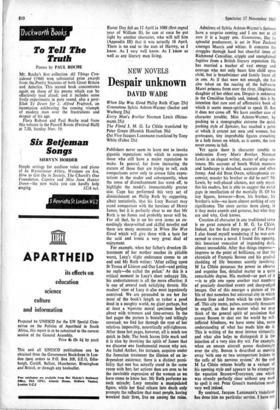The good companion
BOOKS
ANTHONY BURGESS
Who collaborated with W. S. Gilbert on The Happy Land? Which great novel-sequence is based on a metaphysical conception of the
unreality and reversibility of time? What is the Hebrew name of Apollyon, angel of the bottomless pit? Which rivers of Damascus did Naaman consider better than all the waters of Israel? Which Scythian priest of Apollo rode the air on an arrow? To which dynasty of Caliphs did Haroun-al-Raschid belong? What new theatre opened on 18 July 1966?
The answers are on the first page of the fourth edition of The Oxford Companion to
English Literature, edited by Sir Paul Harvey, revised by Dorothy Eagle (ouP 50s). It is not a question of those who need them (Gilbert Arthur a Beckett; A la Recherche du Temps Perdu; Abaddon; Abana and Pharpar; Abaris; Abbasides; Abbey Theatre, Dublin) needing the book. There are plenty of genuine encyclo- paedias about, and these will tell you about the aardvark, aardwolf, Aaron (his beard and rod) and the abacus as well. The curious and irresis- tible quality of this compilation is its mode of selection and the resultant strangeness of its juxtapositions. Thus, Eppie, who comes in Silas 1 Marner, is followed by Eppur si muove ('see
Galileo'), which, with Er the son of Armerrius, The Myth of, makes a sandwich of Sir Jacob Epstein, who 'carved and modelled large figures, often of religious subjects.' In other words, we miss, and are glad to miss, the im- partiality and impersonality of the encyclo- paedia, but the alphabet is there to impose the most piquant patterns. It's more like reading a Mic.hel Butor novel than a cold work of reference.
One entry that Dorothy Eagle could have given us might have told us all about Sir Paul Harvey, whose child this Companion was (her
job has been to bring the work up to date, though—following the Harvey cautiousness— not aggressively so). Harvey's aim was to help
ordinary readers of literature, whatever that is or was, to follow up references and clarify allusions. But he evidently had an Autotycan, or Kinbote-Nabokov, mind and liked oddities for their own sake. Of 'what use, for instance, ' is it really to know the names of all those
'Dogs, famous in History, Myth, and Fiction'?
It's pure 'Round Britain Quiz' stuff, yet (or should that be 'hence'?) totally seductive. Who, then, owned the following: Keeper, Crab, Math, Music? That's right—Emily Brontë. Launce in Two Gentlemen of Verona, Richard
11 (according to Froissart, Math deserted his
master when his deposition was imminent and attached himself to Bolingbroke), Wordsworth. For completeness, there ought to be a section on cats, but Harvey was evidently no cat-man. Admittedly, Hodge, Dr Johnson's cat, is men- tioned, but (it seems to me) rather grudgingly. Horses, on the pther hand, are so important that Anion, Bayard, Black Bess and the rest of them have solus entries. How do I find out the name of Cowper's pet hare? I don't; I have to know it (Puss) already.
then there's . the matter of the very full sYnopses of the novels that Harvey evidently admired. I've never been able to read Trollope with any pleasure, but Harvey makes the task
unnecessary. Thus, just above , Ayenbite of
lnwit and Ayer, Alfred Jules, is a loving sum- mary of Ayala's Angel: 'Lucy and Ayala Dormer, after having been brought up in an artistic and luxurious home, are left penniless orphans . . .' But for Awkward Age, The, we're merely told- that it is by Henry James (q.v.) and was published in 1899. Ambassadors, The, does all right, though: . . Sadly dis- illusioned, but still insisting on the necessity of Chad's loyalty to Mme de Vionnet, Strether from a sense of duty turns his back on Paris.' Pages 22 and 23 are, in fact, pretty good. You get, as well as Ambassadors, The, a save-work synopsis of Meredith's Amazing Marriage. The, a brief summary of Meinhold's Amber Witch, Mary Schweidler, The, and a useful examinee's guide to Amelia. You also get a full account of John Wilson's Ambrose's Tavern, where the Nodes Ambrosiarrae had their setting: this is real Harvey country, which a more swinging companion-compiler would not wish to visit. Scott, too, comes in for the most adoring of expatiations. There's a cosy, dated, tobacco-smelling, worn-leather bookishness about Harvey, and it's one of his charms.
The task of bringing him up to date had evident dangers. How far should a bow be made to the scientists, who had so little space in Harvey's library? Boldly, Mrs Eagle has admitted a pretty full entry on Einstein, in- cluding an account of the Lorentz Transforma- tion, complete with mathematical formula; but other revolutionaries of thought do not do so well. Bertrand Russell has about one sixth of the space allotted to Ruskin, and Rutherford gets less than Mrs Gaskell's Ruth. Existential- ism has a very sound entry, as does Sartre himself, but there is no reference to Ldvi- Strauss, and Marshall McLuhan seems not to exist. The non-literary arts are very strangely served—a little article on Benjamin Britten, but nothing on either Elgar or Vaughan Williams; Picasso, but not Stravinsky; no film-makers at all. I suppose the answer to my objections about such omissions must be that anything not directly literary is, so to speak, ex gratia: we have no particular rights. This is the quirky book that Harvey made, and these are addi- tions in the same quirky style.
But with the post-Harvey literary 'entries we can, perhaps, be less indulgent. Some of these are excellent—the ones on Joyce, Hemingway, Mann, Beckett, for instance—but the principle
of selection, when it comes to the not quite great, is very odd. John Osborne is here, pre- sumably because of the angries, but the influence of Pinter—not here—has been more considerable. Charles Snow gets in, and so, for some reason, do Gerhardi and Lawrence Durrell, but Amis—whose Lucky Jim is as im- portant a myth as Jimmy Porter—is absent, though Anus and Amiloun continues to cele- brate a noble friendship. No Golding but Arthur (translator of Ovid, 1536?-1605?), no Angus Wilson, Murdoch, Spark. And if it be argued that there are no settled reputations here, how long do we have to wait? Presum- ably we've waited long enough to know that Rab and His Friends is no longer even of his- torical interest and that William de Morgan is only a master to the man who called himself Oliver Edwards. As for Anthony Burgess, I am reconciled now to seeing the name survive only as that of a seventeenth century divine who wrote too many sermons on the one text from St John.
Perhaps all these objections are beside the point. The point for me has been chiefly the fruc- tifying value, on a practising writer sometimes desperate for ideas, of a casual browsing through any two facing pages. I open at ran- dom: pages 446 and 447. These take me from Kennedy, Margaret (author of The Constant Nymph) to Kierkegaard, Soren Aabye. Good, I shall write a novel about an Anglo-Dane called Soren Kennedy, who lives in Kensing- ton and is doing research on St Mungo (who is also St Kentigern). Discovering that this saint probably sojourned for a time on the Isle of Man (Key % House of), he goes to Douglas, where he meets a beautiful Arab divorcée called Khadijah, after the first wife of the Prophet. She is very interested in Khusrau I, king of Iran (531-79), and they argue a great - deal, despite an evident and inescapable physi- cal attraction, about their irreconcilable faiths. - A man called W. P. Ker, a fellow of All Souls on holiday, tries to heal their breach, urging that they see how ridiculous religious bigotry is by reading the episodes about the fanatical covenanter Kettledrummle in Scott's. Old Mortality (q., inevitably, v.).
ICIsadijah falls for Ker, and Kennedy be- comes violently jealous. But Ker is in love with a certain Ebenezer Balfour (Kidnapped), whom he is expecting to come to Douglas in a day or two. Balfour duly arrives, along with a certain Alan. Breck, a con-man who pretends to weary for the heather and the deer, but whose Scots accent is suspect. But Balfour is under his power, and it is left to Khadijah to show the greatness of her love for Ker by ex- posing Breck as a mere adventurer who, when she pretends to wealth, at once starts to woo her and, when deliberately made drunk on a local whisky called Jack Ketch (or Captain Kettle), speaks in an American accent and proves to be a penniless descendant of Francis Scott Key of Frederick, Maryland, author of 'The Star-Spangled Banner.'
The ddnouement brings in learned discus- sions on St Kentigern's miracles (it was on the Isle of Man that he revived St Serf's favourite robin-redbreast) and on proto- existentialism. The Companion has 961 pages, so no writer, especially a novelist, need ever be short of material. At a pinch, he can always refurbish a plot by Meredith, Scott or Hardy. When the work is complete, he can check on the copyright position in Appendices 1 and II. And if any of his characters says that Easter Day fell on 12 April in 1088 (first regnal year of William II), he can at once be put right by another character, who will tell him (Appendix III) that it was actually 16 April. There is no end to the uses of Harvey, as I know. As I very well know. As I know as well as any literary man living.



































 Previous page
Previous page